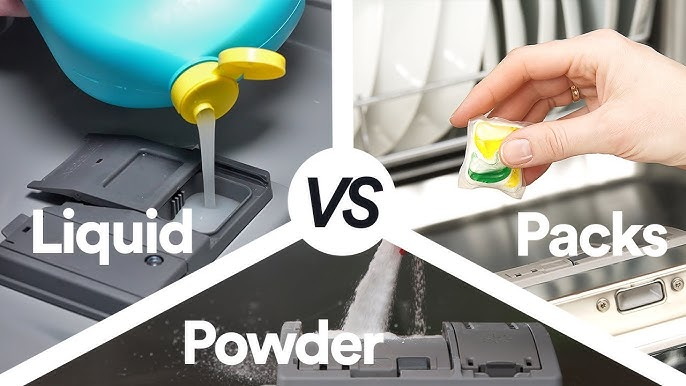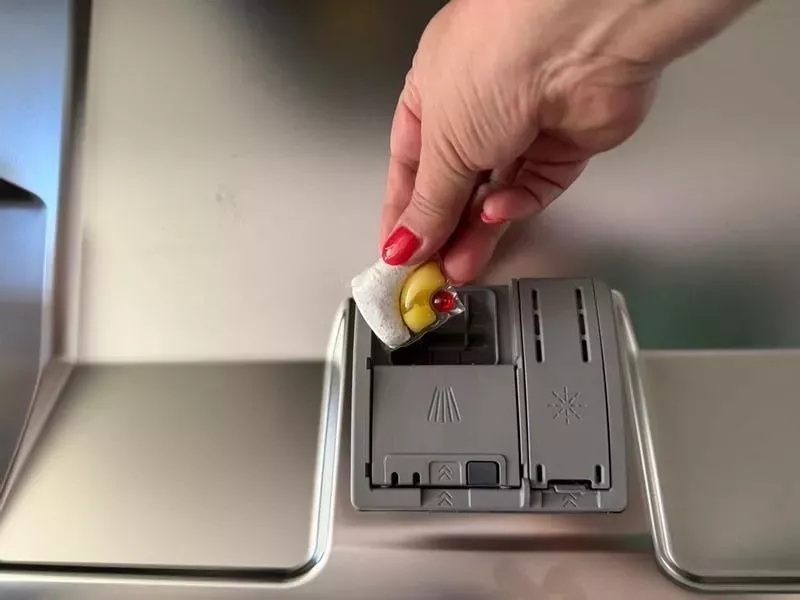Dongguan UFine Daily Chemical Co.,Ltd.
- All
- Product Name
- Product Keyword
- Product Model
- Product Summary
- Product Description
- Multi Field Search
Views: 222 Author: Tomorrow Publish Time: 11-24-2025 Origin: Site











Content Menu
● Understanding the Differences Between Laundry Pods and Dishwasher Detergents
● Why Laundry Pods Are Unsuitable for Dishwashers
● How to Handle Accidental Use of Laundry Pods in Dishwashers
● Choosing the Right Detergent for Your Dishwasher
● Environmental and Cost Considerations
● Comparing Laundry Pods and Dishwasher Pods Side by Side
● FAQ
>> 1. Can laundry detergent pods damage my dishwasher?
>> 2. What should I do if I put a laundry pod in my dishwasher by mistake?
>> 3. Why do dishwasher detergents produce less foam than laundry detergents?
>> 4. Are dishwasher pods safe for dishes and glassware?
>> 5. Can I substitute dish soap or laundry detergent for dishwasher detergent?
Laundry detergent pods have become a popular choice for convenient and effective clothes cleaning, packaged in pre-measured doses that simplify laundry tasks. However, many people wonder if these pods, given their detergent nature, can also be used safely in dishwashers instead of dishwasher-specific detergents. The simple and informed answer is no; laundry detergent pods should not be used in dishwashers due to significant differences in their chemical formulation, intended cleaning targets, and mechanical compatibility. Using laundry pods in a dishwasher can cause excessive sudsing, poor cleaning results, appliance damage, and potential health risks from residue.

Laundry detergent pods and dishwasher detergents, including pods or tablets, have distinct formulations designed for very different cleaning environments and soil types. Laundry pods are formulated primarily to remove dirt, stains, and odors from fabrics. They contain enzymes and surfactants targeted at breaking down organic stains like coffee, grass, or oil on clothing fibers. Additional additives like fabric softeners, brighteners, and fragrance are common, aimed at improving fabric feel and scent. These pods are encased in a water-soluble film designed to dissolve in the moisture-rich environment of a washing machine drum.
In contrast, dishwasher detergents are designed to break down food residues, grease, and mineral deposits found on dishes, glasses, and utensils. They include highly alkaline compounds, specific enzymes (like protease and amylase) for food residue breakdown, rinse aids to reduce spots, and anti-scale agents to combat hard water issues. Importantly, dishwasher detergents produce very low suds since foaming interferes with dishwasher function and can cause mechanical problems or leaks. Dishwasher pods are typically larger, often rectangular, and encased in a dissolvable film optimized for gradual release in a dishwasher cycle.
The key reasons laundry detergent pods should not be used in dishwashers include:
1. Excessive Sudsing and Overflow Risk: Laundry pods generate much higher foam levels than dishwasher detergents. In the confined dishwasher space designed for low suds, this can cause overflow, leakage, and even internal damage.
2. Ineffective Cleaning on Dishes: The enzymes and chemicals in laundry pods target fabric stains, not food residues. This mismatch results in inadequate cleaning and can leave visible residue or film on dishes and glassware.
3. Residue and Safety Concerns: Laundry pods may leave residues on dishes because they are not formulated to rinse off completely in dishwasher cycles. Consuming food from dishes with such residues poses health risks.
4. Potential Appliance Damage: Using detergent pods not meant for dishwashers can damage dishwasher components or disrupt wash cycles, possibly leading to costly repairs.
If laundry detergent pods are accidentally placed in a dishwasher, it is critical to stop the cycle immediately. Remove any leftover pod fragments and run multiple rinse cycles with hot water to flush out detergent residues and excess suds. This reduces the risk of residue buildup, prevents damage, and minimizes health risks. Performing two or more full rinse cycles is advisable for thorough cleaning.
Optimal dishwasher performance and safety come from using detergents explicitly formulated for dishwashers. Options include:
- Dishwasher pods or tablets that contain low-foam detergents, enzymes for food residue removal, rinse aids, and anti-scale agents.
- Powder detergents that dissolve evenly and clean effectively.
- Liquid detergents that offer dosing control and good rinseability.
Using proper dishwasher detergents ensures your dishes come out spotless and free from harmful chemical residues while preserving the appliance's function.

Dishwasher pods offer convenience with pre-measured doses, reducing detergent waste and simplifying use. However, they tend to be more expensive per load compared to powders or liquids. Traditional dishwasher detergents often offer greater cost-effectiveness and dosing flexibility. Environmental impact varies based on packaging and chemical composition; consumers may prefer eco-friendly options available in powders or liquids.
| Aspect | Laundry Detergent Pods | Dishwasher Detergent Pods |
|---|---|---|
| Formulation target | Fabric stains, odors, softening | Food residues, grease, mineral deposits |
| Ingredients | Enzymes, surfactants, softeners, fragrances | Alkaline agents, enzymes, rinse aids |
| Sudsing level | High suds | Low suds |
| Pod size and shape | Smaller, round or irregular | Larger, rectangular or cuboid |
| Film dissolution | Water-soluble film in washing machines | Dissolvable film optimized for dishwashers |
| Cleaning effectiveness | Effective on fabrics, not dishes | Effective on dishes, not fabrics |
| Safety for appliances | Not safe for dishwashers | Safe for dishwashers |
Laundry detergent pods are specifically engineered for fabric cleaning in washing machines, with ingredients and sudsing levels unsuitable for dishwashers. Using laundry pods in your dishwasher risks excessive suds, poor cleaning results, chemical residue on dishes, and potential damage to your appliance. For best results and safety, always use detergents specifically formulated for dishwashers. If accidental use occurs, immediately stop the cycle and run multiple rinse cycles with hot water to minimize harm.

Yes. Laundry pods produce excessive suds that can cause leaks, residue buildup, and mechanical damage. They are not designed for dishwasher use.
Stop the dishwasher immediately, remove any pod residue, and run at least two rinse cycles with hot water to flush out detergent and suds.
Dishwasher detergents are formulated to minimize suds because excessive foam interferes with dishwasher mechanics and can cause leaks, unlike laundry detergents made for washing machines.
Yes, dishwasher pods are designed to clean effectively and rinse off completely, leaving dishes and glassware safe and spot-free.
No. Dish soap creates too much suds, and laundry detergent is chemically inappropriate for dishwashers. Only use detergents made for dishwashers.
[1](https://www.watersolubleplastics.com/a-news-how-to-tell-laundry-pods-from-dishwasher-pods)
[2](https://www.myappliances.co.uk/integrated-dishwashers/dishwasher-guides-and-advice/the-pros-and-cons-of-using-dishwasher-detergents-vs-dishwasher-pods)
[3](https://www.townappliance.com/blogs/town-appliance-official/dishwasher-pods-vs-liquid-detergent)
[4](https://www.ufinechem.com/how-to-tell-laundry-pods-from-dishwasher-pods.html)
[5](https://www.fredsappliances.com/blog/dishwasher-detergent-comparison)
[6](https://www.reddit.com/r/Costco/comments/156rd9h/dishwasher_detergent_budgetfriendly_vs_pods_vs/)
[7](https://www.reddit.com/r/laundry/comments/1fxryt5/hi_is_this_for_laundry_or_dishwasher/)
[8](https://www.consumerreports.org/appliances/dishwasher-detergents/smarter-which-is-better-dishwasher-pods-liquid-or-powder-a1841599059/)
[9](https://news.wisc.edu/curiosities-whats-the-difference-between-dishwasher-detergent-laundry-detergent-and-dish-soap-why-arent-they-interchangeable/)
[10](https://home.howstuffworks.com/home-improvement/household-hints-tips/cleaning-organizing/dishwasher-pods-or-powders.htm)